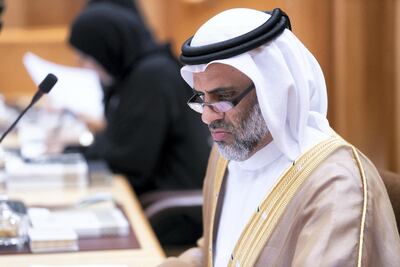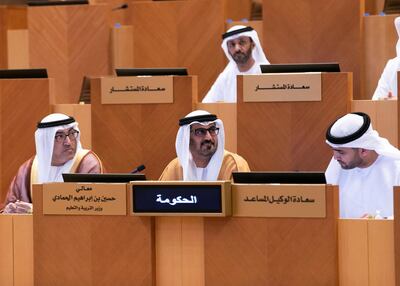The UAE government must do more to address a growing shortage of government schools for Emiratis, an FNC member has said.
Hamad Al Rahoomi, deputy speaker of the Federal National Council, said residents moving to new developments and new communities often found a lack of suitable options.
In some instances, he said parents had no choice but send their children to closer, more expensive private schools to avoid lengthy commutes.
Meanwhile, pupils unable to afford higher tuition fees were forced to travel longer distances to government schools which were often crowded.
“Public schools have become [half] empty in old neighbourhoods like Al Wuhaida and Al Hamriya [in Dubai] where many nationals used to live,” said Mr Al Rahoomi.
"They are operating with half the capacity now.
“They [new developments] have all kinds of services like Emirates Post. But the ministry hasn’t opened public schools there so private schools took their place.”
Mr Al Rahoomi made his remarks to Hussain Al Hammadi, the Minister of Education, at the first FNC session held this year.
He stressed that families who had recently moved to new neighbourhoods only to find a shortage of suitable government schools now faced a real dilemma.
Parents, he said, could either opt for congested, lengthy school runs to government schools further afield or pay private school fees closer to home.

He said that in Dubai, areas like Al Khawaneej 1 and 2, Al Mizhar and Al Tewar were all examples of large Emirati populations where few government schools existed.
Addressing the FNC on Tuesday, Mr Al Rahoomi revealed the number of public schools in Dubai had dropped by seven to 71 since 2015.
But he noted the number of private schools in the emirate over the same period had increased from 169 to 209, a rise of 23 per cent.
He also gave figures suggesting the number of Emiratis attending private schools was rising.
He said 33,630 Emirati pupils were registered at Dubai private schools last year, compared with 31,000 in 2015.
The issue of government school shortages appears to be a nationwide problem.
The National spoke to a number of parents in other emirates who agreed more public schools needed to be built.
“I have a boy and a girl who used to go to Zamzam School in Al Kharan,” said Umm Khaled, an Emirati mother of six who lives in Al Fahlen in RAK.
“When the ministry decided to close the school last year all the parents faced issues in finding a place for their children.
“Some parents transferred children to private schools and those who couldn’t afford it had to send them to a public school with overcrowded classrooms.
“I couldn’t move them to a private school so I had to enrol them in Al Kharan School.
“There are other schools but they are considered far away from our house and I don’t want my children to spend too much time on the bus.”
Ahmed Al Saddi, a 43-year-old Emirati father of 10 from Al Raheeb in Fujairah, said there was clearly a demand for more government schools.
He said one of his children who attends Al Bidyah public school spent about four hours a day commuting.
“He arrives home exhausted and there is no other option as the school he used to go to near our place has been closed,” he said.
“There are 30 pupils in my son’s class and that is considered a lot. I don’t think the teachers can handle such a high number in one class.”
At the FNC session, Mr Al Hammadi agreed to consider the issue closely.
In respect of Dubai, he said two new “educational complexes” were being built in Al Mizhar and Al Barsha.
He also said the ministry had plans in place to increase the number of public schools across the whole country.
“There hasn’t been a single Emirati pupil who applied to a public school and was rejected,” he told members.


